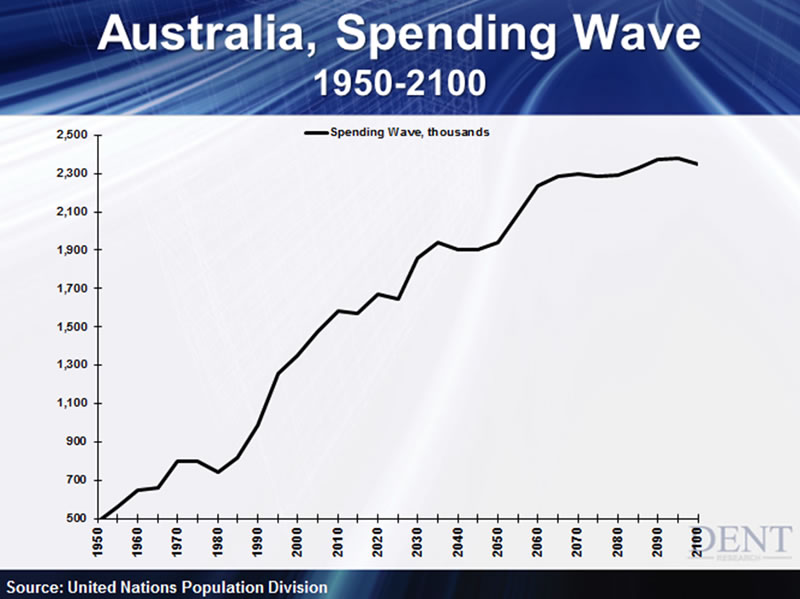Greece Crisis and the Top Demographic Trends of Our Time
Economics / Demographics Jul 07, 2015 - 01:37 PM GMTBy: Harry_Dent

 Greece is not the place to be right now.
Greece is not the place to be right now.
Its citizens are capped out at $67 a day on the ATM. Its pensioners are pinching pennies. Its doctors are leaving in droves. Its long-term demographics are deplorable, making the chances for recovery more and more abysmal. It’s a nightmare!
I’ve already explained that large-scale debt deleveraging will be one of the triggers that sends the global economy back into crisis. Now that Greece has defaulted on its $1.7 billion IMF payment, they’re looking more and more like the beginning of the end.
If Greece kicks the bucket, it could spill over to the other weak euro zone members — namely, Portugal, Italy, and Spain. Lance explained yesterday that investors who are fearing the worst from Greece dropped out of not only Greece debt but those other lower quality bonds as well.
With so many developed countries already sitting on the brink, and with the worst yet to come, it’s important to consider which countries will be hit the hardest… and which will fare the best going into the next recovery.
The truth is that, with the lower birth trends that come from increasing urbanization, wealth, and education, almost all developed countries have sideways (at best) to falling demographic trends for decades to come.
But there are a few exceptions…
And they are, in order: 1) Australia… 2) Israel… 3) Switzerland… 4) Norway… 5) Sweden… and 6) New Zealand.
In these countries, the millennials or “Echo Boomers” will ultimately bring them to new heights.
They’re the few countries that, unlike the U.S., saw a larger generation following their baby boom. These demographics are partially due to higher birth rates but mostly because of strong immigration policies.
When you consider how the stronger demographics in a country like Australia translates into more spending, you understand why they’re at the top! Here’s a look at their spending wave from the middle of last century to the end of this one:

It’s been flat from 2010 to 2015, but after this, it’s the only developed country with slightly positive trends into 2018.
But in the first stage of the next global boom, from 2023 to 2036, Australia will have the strongest surge of any developed country. It’ll have a minor downtrend into 2045, but then another boom later on in the century, around 2065 to 2070.
Right now, Australia has the highest immigration per capita of any major, wealthy, developed country. It’s greater than even Canada or the U.S., which are immigration magnets. And it could continue to enjoy good immigration levels at times, even in the coming depression, as the wealthy flee countries such as China.
The bottom line is that Australia simply has the best demographic trends of any wealthy, developed country. While the bubbles in China, commodities, and their own real estate will hurt them especially in the next global financial crisis, there isn’t a country with lower debt, or one better positioned for the next boom.
The other five have similar patterns. They’ll see (or are already seeing) demographic downturns into the middle or end of next decade. After that, they’ll enjoy a surge going into 2040.
Unfortunately, in the grand scheme of things, those six are only smaller countries.
Australia only has a population of 23 million people. Sweden has even fewer at 9.5 million. And the others even less: Israel at 8.3 million, Switzerland at 8.1 million, Norway at 5 million, and New Zealand the lowest at 4.5 million.
Combined, these countries contain less than a sixth of the U.S. population.
The greatest demographic growth of all will come out of the emerging world, between 2023 and 2070. Those are the countries that will experience a boom due to greater urbanization and a growing middle-class consumer population (though they won’t become as affluent as their developed-world counterparts).
That’s when we could see the greatest commodity boom and bubble in history, as emerging countries dominate growth. And Australia, with its strong commodity exports, is perfectly set to ride the wave.
Harry
Follow me on Twitter @HarryDentjr
Harry studied economics in college in the ’70s, but found it vague and inconclusive. He became so disillusioned by the state of the profession that he turned his back on it. Instead, he threw himself into the burgeoning New Science of Finance, which married economic research and market research and encompassed identifying and studying demographic trends, business cycles, consumers’ purchasing power and many, many other trends that empowered him to forecast economic and market changes.
Copyright © 2015 Harry Dent- All Rights Reserved Disclaimer: The above is a matter of opinion provided for general information purposes only and is not intended as investment advice. Information and analysis above are derived from sources and utilising methods believed to be reliable, but we cannot accept responsibility for any losses you may incur as a result of this analysis. Individuals should consult with their personal financial advisors.
© 2005-2022 http://www.MarketOracle.co.uk - The Market Oracle is a FREE Daily Financial Markets Analysis & Forecasting online publication.


